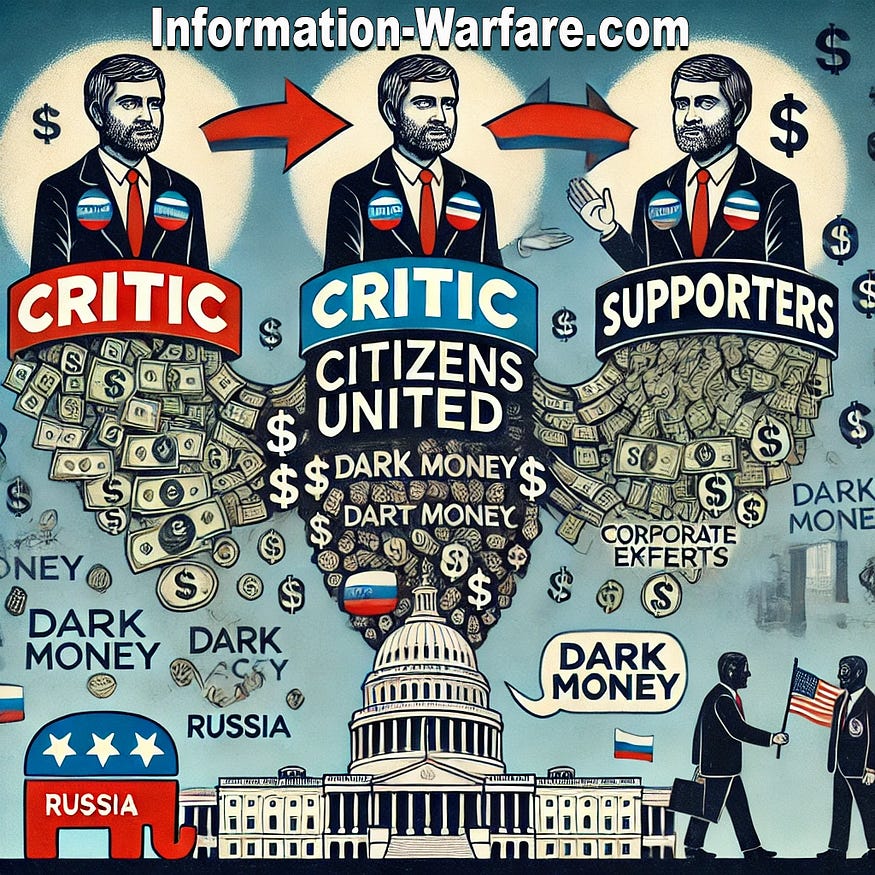The Changing Faces of Convictionless Leadership
Politicians Without Principles: The Influence of Citizens United Dark Money on Political Allegiances

Likelihood of Russia Using Citizens United for Political Influence:
Mechanism for Influence:
Citizens United Ruling: The 2010 Supreme Court decision in Citizens United v. FEC allows for unlimited political spending by corporations and unions, as long as it’s independent of campaign coordination. This creates opportunities for foreign entities to potentially influence U.S. politics indirectly through third parties such as PACs and Super PACs.
Dark Money: The rise of “dark money,” funds from undisclosed sources used for political purposes, exacerbates the risk of foreign influence. This lack of transparency makes it difficult to trace the origins of political donations.
Historical Context:
Russian Interference: There is documented evidence of Russian interference in the 2016 U.S. presidential election, primarily through social media campaigns and cyber-attacks. This sets a precedent for the possibility of using financial means to influence U.S. politics.
Legal and Regulatory Gaps: While direct contributions from foreign nationals to U.S. elections are illegal, the complex network of financial intermediaries and lack of stringent enforcement create loopholes that can be exploited.
Potential Targets:
Transforming Critics: Republican critics of Trump who have later transformed into staunch supporters could be influenced by various factors, including financial incentives. Super PACs and other political entities could be vehicles for such transformations.
Project 2025: Support for initiatives like Project 2025, which aims to prepare a conservative policy agenda, could be bolstered by targeted financial contributions from undisclosed sources.
Factors Influencing Political Transformations:
Financial Incentives:
Campaign Contributions: Significant financial backing for re-election campaigns can persuade politicians to align with certain agendas. The need for campaign funding often makes candidates susceptible to influence from well-funded entities.
Lobbying Efforts: Continuous lobbying and the promise of lucrative post-political career opportunities can also sway politicians.
Political and Social Pressures:
Party Loyalty: Pressure to conform to party lines and maintain political alliances can drive critics to change their stance.
Constituent Influence: Politicians may shift their positions based on the perceived preferences of their voter base, especially in response to targeted media campaigns that shape public opinion.
Strategic Alignments:
Policy Agreements: Alignment with broader conservative or nationalist policies that resonate with the MAGA agenda.
Career Advancement: Politicians may see alignment with influential figures like Trump as a pathway to greater political influence and career advancement.
Steps to Mitigate Foreign Influence:
Legislative Actions:
Campaign Finance Reform: Passing laws that require full disclosure of political contributions and enhance transparency in political spending.
Foreign Influence Regulation: Strengthening regulations to prevent foreign entities from exploiting financial loopholes to influence U.S. elections.
Enhanced Oversight:
FEC Enforcement: Increasing the enforcement capabilities and resources of the Federal Election Commission to monitor and investigate suspicious financial activities in political campaigns.
Intelligence Collaboration: Collaborating with intelligence agencies to track and prevent foreign interference in the political process.
Public Awareness:
Media Literacy: Promoting media literacy to help the public recognize and resist disinformation campaigns.
Transparency Initiatives: Supporting organizations and initiatives that work towards greater transparency in campaign finance.
Conclusion
While the exact likelihood of Russia using Citizens United to funnel money to transform political critics into supporters is difficult to quantify, the potential for such influence exists due to the ruling’s facilitation of unlimited, often opaque political spending. Transformations from critics to supporters can be driven by financial incentives, political pressures, and strategic alignments. Addressing these vulnerabilities requires comprehensive campaign finance reform, enhanced regulatory oversight, and public awareness initiatives.
For further information:
- [Oyez: Citizens United v. Federal Election Commission] (https://www.oyez.org/cases/2008/08-205)
- [Center for Responsive Politics: Dark Money Basics] (https://www.opensecrets.org/dark-money/basics)

